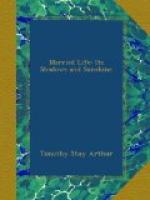“The notoriety given by the publication of the acts of his base conduct in New York caused Eaverson to feel little at ease in this city. Some months afterwards he removed to the South with his wife, much against the wishes of her friends. Harriet did not want to go, but she could do no less than accompany her husband.
“Some three years afterwards, it was whispered about that Harriet had left her husband and returned home to her father; but that the matter was kept very quiet, and that she had not been seen by any of her old friends. It was said, that after living some time at the South, Mr. Eaverson grew indifferent towards his wife. A virtuous woman, she could not but be deeply shocked on discovering her husband’s want of virtue. This she could not conceal; and its appearance was a standing reproof and condemnation of his principles and conduct. No bad man could endure this. Its effect would be certain estrangement. From dislike towards his wife, his feelings gradually deepened into hatred. Open abuse soon followed neglect; when she fled from him, with two young children, and sought the protection of her father’s house.
“It was nearly a year after Harriet’s return, before I saw her. I could hardly believe, when I did meet her and grasp her hand, that the pale, dejected, care-worn being who stood before me was the same with the light-hearted, beautiful, gay young girl I had known but a few years back. Alas! how surely does pain of mind forestall the work of time!
“A few days after this meeting, which made me sad for weeks, I spent an afternoon and evening with Mrs. Williamson, formerly Sarah Corbin. She had two children, a boy and a girl, and was living somewhat secluded, but with every comfort she could desire. Her husband was a merchant in a good business. When he came home at tea-time and met his wife, it was with one of those quiet but genuine smiles that you know come from the heart. He welcomed me, as he always did, with great cordiality; and then calling for Sarah, his eldest child, who ran in from the next room the instant she heard his vice, he took her upon his lap, and, after kissing her with great tenderness, asked and answered a dozen little questions to her great delight. At tea-time Mr. Williamson conversed more freely than was usual with him when I was present. I noticed, as I had often done before, that, on whatever subject he spoke, his remarks, though few, were full of good sense, and indicative of close observation. The slightest deviation from honour or integrity met with his decided condemnation, while virtuous actions were as warmly approved. I could perceive, from the expression of his wife’s face, and the tones of her voice when she spoke, that she not only held her husband in high estimation, but loved him with a tenderness that had grown with years. Qualities of mind and heart, not external attractions, such as brilliant accomplishments, beauty, or wealth, had drawn her towards him at first: these had won her young affections, and they had become purer and brighter, and increased in attractive power as year after year went by.




